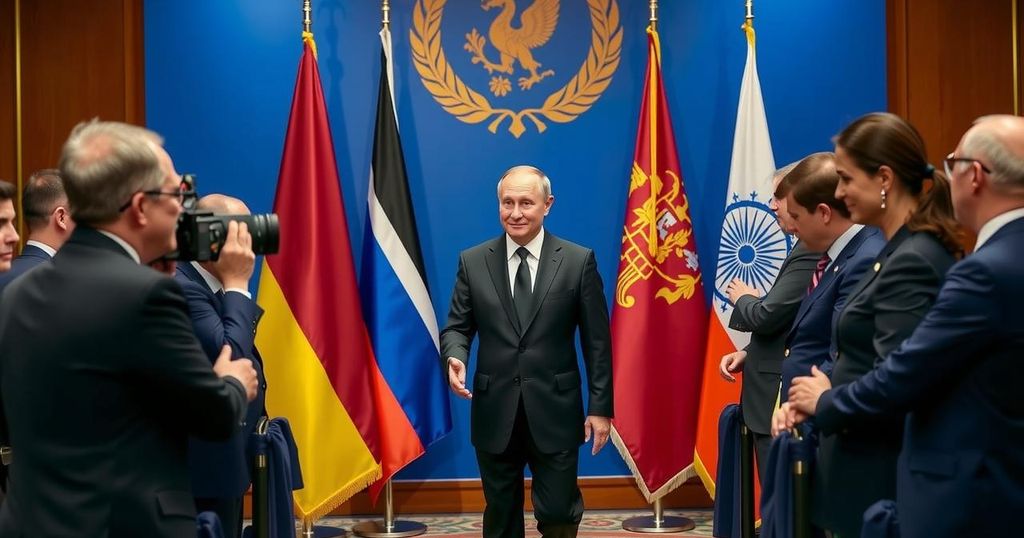Russian President Vladimir Putin hosted a summit of the Brics group, gathering 36 world leaders to demonstrate Russia’s international alliances amid geopolitical isolation due to the Ukraine conflict. Key figures include Xi Jinping and Narendra Modi, as the group seeks to challenge Western economic dominance and promote a new global order. The expansion of Brics highlights challenges to ideological unity and voting influence in global financial institutions, which could have significant implications for future international relations.
In a significant display of international partnerships, Russian President Vladimir Putin has convened a summit of the Brics nations, hosting 36 world leaders including representatives from China, India, and Iran. This gathering aims to counter the narrative of Russia’s isolation on the global stage amidst the ongoing repercussions of the Ukraine conflict and the International Criminal Court’s warrant for Putin’s arrest related to the abduction of Ukrainian children. The Brics summit, taking place over three days, marks the largest international meeting hosted by Putin since the onset of the invasion of Ukraine in February 2022. Uncertainties loom regarding the attendance of UN Secretary General António Guterres, who might face backlash for attending, given the current geopolitical landscape. Putin is scheduled to hold bilateral meetings with key figures, including Chinese President Xi Jinping and Indian Prime Minister Narendra Modi. Russia envisions the Brics group as representative of a global majority, capable of initiating a new world order that challenges the dominance of Western economies and the influence of the US dollar, which is perceived as a tool of political leverage through sanctions. Iranian President Masoud Pezeshkian emphasized the importance of Brics, stating that it could provide an avenue to escape American hegemony and promote multilateralism. However, the expansion of Brics membership introduces complexities regarding ideological coherence. While nations like India and Brazil pursue economic independence from the dollar, their commitment varies compared to China and Russia. Brazilian President Luiz Inácio Lula da Silva notably declared that Brics does not seek to oppose anyone. Analyst Alex Gabuev articulated that the summit serves as a notable diplomatic victory for Putin, suggesting that it projects an image of Russia as an integral member of a rapidly growing collective that can influence the international order. Past events have demonstrated the delicate balance within the group, particularly following Russia’s actions in Ukraine, which led to varied responses among member states in the UN general assembly. Despite boasting a combined GDP that surpasses that of the G7 and the EU, Brics+ continues to grapple with the limitations posed by its voting power in institutions like the International Bank for Reconstruction and Development (IBRD), where representation remains tied to financial contributions. As geopolitical dynamics evolve and as political landscapes shift, the outcomes of this summit will likely have lasting implications on global relations and economic frameworks.
The Brics group, originally composed of Brazil, Russia, India, China, and South Africa, has expanded to include additional countries seeking membership. This summit occurs against a backdrop of geopolitical tension and the rise of non-Western powers seeking to establish greater autonomy from Western-dominated financial systems, particularly in the context of U.S. sanctions and its overall influence on global trade and politics. The role of Brics is increasingly viewed as pivotal for nations that aim to create alternative economic systems and counterbalance the existing Western order.
The Brics summit symbolizes a crucial moment in global diplomacy, showcasing Russia’s efforts to assert its position within a multipolar world amidst isolation pressures. As leaders deliberate on economic alliances and strategies to counter Western dominance, the future of international relations will likely be shaped by the outcomes of such gatherings. Moving forward, Brics will need to navigate the complexities introduced by its expanded membership while maintaining a cohesive agenda.
Original Source: www.theguardian.com






